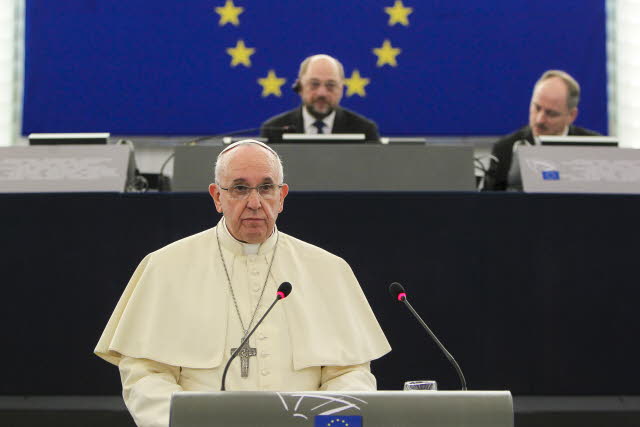A Europe “that revolves not around the economy but around the sacredness of the human person,” in which “technical and economic questions” no longer “prevail in the political debate” but “the human being,” a community that no longer “confuses ends and means. This is the European Union that Pope Francis would like to see, and he asks MEPs to commit to building it. During a historic speech before the plenary session of the European Parliament, the second by a Pontiff in the entire history of the EU, the Pope, applauded loudly by the entire Chamber, forcefully called for leaving aside the “bureaucratic technicalities of the institutions” and fighting for the “dignity” of man.
The Holy Father’s visit to the European Parliament is brief, the first leg of the short but intense trip that also takes him to the Council of Europe. “I hope today is not too tiring: little time, many things,” the Pontiff jokes with journalists traveling with him on the flight to Strasbourg. Arriving at the Parliament building, there is just enough time for the flag-raising ceremony hoisting the Vatican’s coat of arms, then the entrance from the protocol entrance, the signing of the roll of honor of distinguished guests, in the company of President Martin Schulz who gives him a book on Jean Monnet’s memoirs in Spanish. Then, directly into the Chamber for the address to the deputies.
“In my view, one of the most common diseases in Europe today is loneliness,” the Pontiff said. A loneliness that “has become more acute as a result of the economic crisis, whose effects continue to have tragic consequences for the life of society.” In recent years, Pope Francis further notes, “There has been growing mistrust on the part of citizens towards institutions considered to be aloof, engaged in laying down rules perceived as insensitive to individual peoples, if not downright harmful.” In short, the impression is one of “weariness and aging, of a Europe which is now a ‘grandmother,’ no longer fertile and vibrant. As a result, the great ideas which once inspired Europe seem to have lost their attraction, only to be replaced by the bureaucratic technicalities of its institutions.”
In this European Union, the Pontiff denounces: “Men and women risk being reduced to mere cogs in a machine that treats them as items of consumption to be exploited, with the result that whenever a human life no longer proves useful for that machine, it is discarded with few qualms, as in the case of the sick, of the terminally ill, the elderly who are abandoned and uncared for, and children who are killed in the womb.” This deformation arises “‘when technology is allowed to take over;’ the result is a confusion between ends and means.”
To restore hope to Europe, Pope Francis calls for focusing on education, which must come from the family, “the fundamental cell and most precious element of any society,” and from “educational institutes: schools and universities.” The Pope also called for a new focus on education. “Young people today are asking for a suitable and complete education which can enable them to look to the future with hope instead of disenchantment,” the Pope said. “There is so much creative potential in Europe in the various fields of scientific research, some of which have yet to be fully explored,” such as “alternative sources of energy, the development of which,” Pope Francis is convinced, “will assist in the protection of the environment.”
But more than anything else, it is necessary to commit to work: “The time has come to promote policies which create employment, but above all, there is a need to restore dignity to labor by ensuring proper working conditions.” To do this, the Holy Father explains, it is necessary to “find new ways of joining market flexibility with the need for stability and security on the part of workers” and favoring ” a suitable social context geared not to the exploitation of persons.”
The need to preserve the dignity of human life also passes through the resolution of the “migration issue,” he said. “We cannot allow the Mediterranean to become a vast cemetery!” the Pope warned. For this reason, member countries must work together. “The absence of mutual support within the European Union runs the risk of encouraging particularistic solutions to the problem, solutions which fail to take into account the human dignity of immigrants, and thus contribute to slave labor and continuing social tensions,” he said. The Pontiff called on Europe to “enact adequate legislation to protect the rights of European citizens and to ensure the acceptance of immigrant.”
By acting on all these fronts, the Holy Father believes one can build “a Europe that revolves not around the economy, but around the sacredness of the human person, around inalienable values. In building a Europe which courageously embraces its past and confidently looks to its future,” and can abandon being “fearful and self-absorbed, in order to revive and encourage a Europe of leadership, a repository of science, art, music, human values, and faith as well.”




